| Srl | Item |
| 1 |
ID:
192897
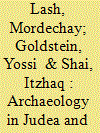

|
|
|
|
|
| Summary/Abstract |
This article examines the trends in archaeological research and the state of conservation of archaeological sites in Judea and Samaria between 1993 and 2022. The absence of Palestinian-Israeli cooperation resulted in the establishment of two parallel bodies that have been responsible for the issue, with no connection between them. In the Israeli-controlled territory, academic involvement declined with only a handful of new excavations. In the Palestinian-controlled territory, many new studies were conducted with foreign assistance, primarily to strengthen Palestinian national identity. An assessment of the state of conservation indicates significant damage as a result of development and antiquities theft. In this region, where the future remains uncertain, relics of the past and the research of these relics appear to have sustained irreversible damage.
|
|
|
|
|
|
|
|
|
|
|
|
|
|
|
|
| 2 |
ID:
151683
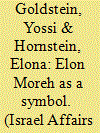

|
|
|
|
|
| Summary/Abstract |
While the establishment of the Elon Moreh locality in the second half of the 1970s constitutes an important milestone in the evolution of post-1967 Jewish settlement in the biblical lands of Judea and Samaria (or the West Bank as they have been known since their 1950 Jordanian annexation), the episode has been surprisingly neglected by the professional literature. This article seeks to fill that lacuna by exploring the factors and circumstances underlying this momentous event, as well as the political and legal struggles attending its occurrence. As such, it not only offers the first comprehensive historical account of this episode but also shed important fresh light on one of the more intractable aspects of the Israeli‒Palestinian conflict.
|
|
|
|
|
|
|
|
|
|
|
|
|
|
|
|
| 3 |
ID:
183982
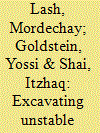

|
|
|
|
|
| Summary/Abstract |
This article examines the factors that influenced the trends in archaeological excavations in Judea and Samaria during the decade attending the 1967 Six-Day War. Examination reveals a close connection between the political trends in Israel as they pertained to Judea and Samaria and the archaeological excavations undertaken in this region. When a prime minister appeared to consider Judea and Samaria an inseparable part of the state of Israel archaeologists followed (Meir). But when prime ministers regarded Judea and Samaria as territory that would be returned to the Jordanians (Eshkol and Rabin), the archaeologists stopped excavating in the region.
|
|
|
|
|
|
|
|
|
|
|
|
|
|
|
|
| 4 |
ID:
123058
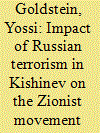

|
|
|
|
|
| Publication |
2013.
|
| Summary/Abstract |
The explosion of terror which took place in the Bessarabian capital in April 1903 and which has since become known as the Kishinev Pogrom had a profound impact on all of Russian Jewry. But as far as the Zionist movement is concerned, and in opposition to what is generally believed about the Pogrom's central role in the history of Zionism, the Pogrom did not lead to any changes in the activities undertaken by the Zionists or in the ideology which they espoused. It was rather that the Pogrom triggered certain phenomena already present in Zionism during the preceding few years.
|
|
|
|
|
|
|
|
|
|
|
|
|
|
|
|
| 5 |
ID:
124918
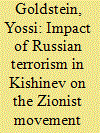

|
|
|
|
|
| Publication |
2013.
|
| Summary/Abstract |
The explosion of terror which took place in the Bessarabian capital in April 1903 and which has since become known as the Kishinev Pogrom had a profound impact on all of Russian Jewry. But as far as the Zionist movement is concerned, and in opposition to what is generally believed about the Pogrom's central role in the history of Zionism, the Pogrom did not lead to any changes in the activities undertaken by the Zionists or in the ideology which they espoused. It was rather that the Pogrom triggered certain phenomena already present in Zionism during the preceding few years.
|
|
|
|
|
|
|
|
|
|
|
|
|
|
|
|
| 6 |
ID:
103225
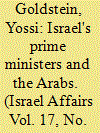

|
|
|
|
|
| Publication |
2011.
|
| Summary/Abstract |
This article identifies similar patterns of behaviour and attitudes towards Arabs and the Arab states among three of Israel's prime ministers in the first 10 years that followed the 1967 war: Levi Eshkol, Golda Meir, and Yitzhak Rabin. All three believed in the right of the Jews to the Land of Israel, in their right to return to their ancient homeland to become a majority, and in the establishment of the state of Israel as the national home of the Jewish people - a state founded on values of democracy and equal of rights for all its citizens. Convinced that the Arabs would never reconcile themselves to Jewish sovereignty in (however small) a part of the Middle East, they believed that Israel must rely on its sword if it were to survive. They differed, nevertheless, over how to achieve these goals. While Eshkol and Rabin believed that Israel should withdraw from most of the territories captured in the 1967 War as a condition for partial (Rabin) or full (Eshkol) peace, Meir did not share this view.
|
|
|
|
|
|
|
|
|
|
|
|
|
|
|
|
| 7 |
ID:
161383
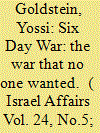

|
|
|
|
|
| Summary/Abstract |
As a military clash that it is still unclear if anyone truly wanted, the June 1967 Six Day War remains one of the most curious military conflicts in modern history. Israel certainly did not prefer the military route, and neither did Egypt, Syria, or the Soviet Union. Yet while it was clear to these parties from the outset that nothing good could come from such a clash, they backed Israel into a corner from which it was unable to extricate itself without going to war. This article explores the factors that caused the war at the time and in the manner it did.
|
|
|
|
|
|
|
|
|
|
|
|
|
|
|
|